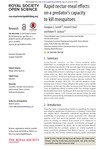Please use this identifier to cite or link to this item:
http://lib.hpu.edu.vn/handle/123456789/21732Full metadata record
| DC Field | Value | Language |
|---|---|---|
| dc.contributor.author | Carvell, Georgina E. | en_US |
| dc.contributor.author | Kuja, Josiah O. | en_US |
| dc.contributor.author | Jackson, Robert R. | en_US |
| dc.date.accessioned | 2016-06-25T01:57:17Z | |
| dc.date.available | 2016-06-25T01:57:17Z | |
| dc.date.issued | 2015 | en_US |
| dc.identifier.other | HPU4160231 | en_US |
| dc.identifier.uri | https://lib.hpu.edu.vn/handle/123456789/21732 | en_US |
| dc.description.abstract | Using Evarcha culicivora, an East African jumping spider (Salticidae), we investigate how nectar meals function in concert with predation specifically at the juvenile stage between emerging from the egg sac and the first encounter with prey. Using plants and using artificial nectar consisting of sugar alone or sugar plus amino acids, we show that the plant species (Lantana camara, Ricinus communis, Parthenium hysterophorus), the particular sugars in the artificial nectar (sucrose, fructose, glucose, maltose), the concentration of sugar (20%, 5%, 1%) and the duration of pre-feeding fasts (3 days, 6 days) influence the spider’s prey-capture proficiency on the next day after the nectar meal. However, there were no significant effects of amino acids. Our findings suggest that benefits from nectar feeding are derived primarily from access to particular sugars, with fructose and sucrose being the most beneficial, glucose being intermediate and maltose being no better than a water-only control. | en_US |
| dc.format.extent | 11 p. | en_US |
| dc.format.mimetype | application/pdf | en_US |
| dc.language.iso | en | en_US |
| dc.publisher | The Royal Society | en_US |
| dc.subject | Biology | en_US |
| dc.subject | Behaviour | en_US |
| dc.subject | Nectarivory | en_US |
| dc.subject | Salticidae | en_US |
| dc.title | Rapid nectar meal effects on a predator’s capacity to kill mosquitoes | en_US |
| dc.type | Book | en_US |
| dc.size | 641KB | en_US |
| dc.department | Education | en_US |
| Appears in Collections: | Education | |
Files in This Item:
| File | Description | Size | Format | |
|---|---|---|---|---|
| 0114_Rapid_nectar.pdf Restricted Access | 641.88 kB | Adobe PDF |  View/Open Request a copy |
Items in DSpace are protected by copyright, with all rights reserved, unless otherwise indicated.
